“A child’s body needs nutrition, not just food.” – Julie Webb Kelley
Have you ever been in work or in class and heard your stomach rumble? In that moment all you can think of is “When is my next meal?” “What can I get on my break?” “Where is the closest food outlet?” “How am I going to make it through the next 45 minutes?”. These are not worries that a child should have. Being able to listen, absorb information, stay engaged are what children should be focused on, and it is what the Breakfast Club of Canada (BCC) is out to accomplish. As the BCC would say “Children should go to school hungry for knowledge not for food”.
INTRODUCTIONS:
Chloe Slessor:
I am currently in my third year here at UBC studying Applied Animal Biology in the Land and Food Systems faculty. I have always had a passion for animals and therefore, took an interest in biology quite young. I have a dog at home who’s almost 11. His name is Toddy and he’s a soft coated wheaten terrier. I have also always had a big interest in horses as my mum used to ride when we lived in England. I picked up riding a few years ago back in Montreal and ride an amazing 17 year old horse called Porto. My sister still rides quite a bit out at the barn so I spend a decent amount of time during the summer out there helping to clean stalls a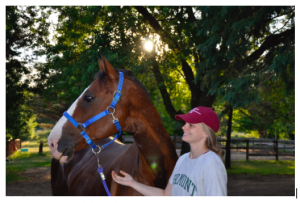 nd groom the horses. Asides from animals, I have always had a side interest in law. Interestingly enough, I plan on going to law school once my undergrad is completed. I hope to find a career that combines law as well as animal welfare. I would really like to spend the rest of
nd groom the horses. Asides from animals, I have always had a side interest in law. Interestingly enough, I plan on going to law school once my undergrad is completed. I hope to find a career that combines law as well as animal welfare. I would really like to spend the rest of
my career working to improve the conditions that many animals in captivity live in and feel as if I am making a difference to better their lives.
Yining (Angela) An:
I am a third year student studying Nutritional Science at UBC. During FNH 250 lecture, I learned how macronutrient and micronutrient intake influence human health, as well as dis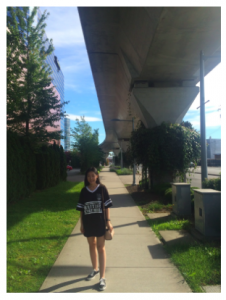 eases caused by deficient or excessive intake. This course inspired me to learn more about how nutrients uptake relates to our body, and also this course let me make my mind to major in nutritional science. During last reading break, I volunteered at Flourance Nightingale Elementary, which aimed at educating kids what is a healthy breakfast should be and why we are supposed to consume less unhealthy food. Through this experience
eases caused by deficient or excessive intake. This course inspired me to learn more about how nutrients uptake relates to our body, and also this course let me make my mind to major in nutritional science. During last reading break, I volunteered at Flourance Nightingale Elementary, which aimed at educating kids what is a healthy breakfast should be and why we are supposed to consume less unhealthy food. Through this experience
I realized that kids can concentrate more on study if they consume a nutritious breakfast, and this is the main reason why I would like to be a part of this program. I hope I can use what I learned from lectures into real life in order to help people around me and also myself to improve the quality of our life.
Mercy Wanalo:
I am a third year student pursuing a Bsc degree in Food Nutrition and Health. Before commencing my studies at the University of British Columbia, I volunteered with the Nutrition Department of a local public hospital in Kisumu Kenya for three months. During that time, I worked closely with expecting and lactating mothers, and children under five years of age, providing nutritional advice, assessing malnutrition, promoting breastfeeding, family planning and other healthy behaviours. These experiences prompted me to realize the precarious situations in which low income families find themselves and inspired me to pursue a career in health nutrition in order to focus on improving healthcare quality. I like to think of myself as an adventurer because I get thrilled by exciting experiences whether it’s skydiving or skinny dipping or taking a trip across the world, you name it and I am your girl. I enjoy spending time with people although it doesn’t always seem like it until I get comfortable with an individual. I guess this would be partly because I come from a relatively big family. I am the youngest in a family of 6 and so I did spend a significant amount of time in my childhood around people. Of late I have discovered that I actually do find so much pleasure in seeing things come to life like say seeing a project that I am working on or an event that I am organizing as part of my involvements on campus materialize. In my free time I bike around campus or take a trip to the beach or watch my favorite TV shows. I also tend to spend a significant amount of time on Youtube. I am really excited about this project and am certain that my teammates and I will learn a lot and have fun while at it.
and lactating mothers, and children under five years of age, providing nutritional advice, assessing malnutrition, promoting breastfeeding, family planning and other healthy behaviours. These experiences prompted me to realize the precarious situations in which low income families find themselves and inspired me to pursue a career in health nutrition in order to focus on improving healthcare quality. I like to think of myself as an adventurer because I get thrilled by exciting experiences whether it’s skydiving or skinny dipping or taking a trip across the world, you name it and I am your girl. I enjoy spending time with people although it doesn’t always seem like it until I get comfortable with an individual. I guess this would be partly because I come from a relatively big family. I am the youngest in a family of 6 and so I did spend a significant amount of time in my childhood around people. Of late I have discovered that I actually do find so much pleasure in seeing things come to life like say seeing a project that I am working on or an event that I am organizing as part of my involvements on campus materialize. In my free time I bike around campus or take a trip to the beach or watch my favorite TV shows. I also tend to spend a significant amount of time on Youtube. I am really excited about this project and am certain that my teammates and I will learn a lot and have fun while at it.
Nika Maghsoud:
I’m a third year student in the Food, Health and Nutrition major at UBC. I was born in Iran and moved to Canada at the age of 10. I pursued this major because I am very passionate about nutrition and health. I hope to reduce food insecurity and food related health is sues around the world through the knowledge I gain in this major. Every year I visit Iran and witness many families undergo food insecurity, and I am very motivated to reduce food insecurity around the world. I enjoy playing sports such tennis and volleyball and dedicate lots of time to my fitness. I train at the gym at least three times a week to attain a fit and healthy body; working out also reduces my stress and boosts my mood. I love meeting new people because I believe every new acquaintance allows me to gain valuable and unique knowledge. Equality in any aspect around the world such as gender, health, and food is very important to me. I’m eager to try as hard as I can to increase food security in my community through this project because I believe every child deserves food security.
sues around the world through the knowledge I gain in this major. Every year I visit Iran and witness many families undergo food insecurity, and I am very motivated to reduce food insecurity around the world. I enjoy playing sports such tennis and volleyball and dedicate lots of time to my fitness. I train at the gym at least three times a week to attain a fit and healthy body; working out also reduces my stress and boosts my mood. I love meeting new people because I believe every new acquaintance allows me to gain valuable and unique knowledge. Equality in any aspect around the world such as gender, health, and food is very important to me. I’m eager to try as hard as I can to increase food security in my community through this project because I believe every child deserves food security.
Claire O’Brien:
I’m currently in 4th year of the Global Resources Program , with a focus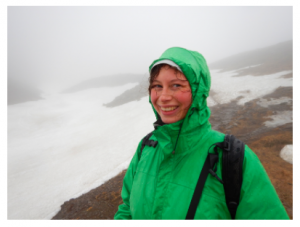 on sustainable agriculture. Growing up on the west coast of Vancouver Island surrounded by old growth rainforest instilled a love for nature in me at a young age, which has now evolved into a passion for conservation. What I love about my university program is that it allows a blending of sciences and humanities, an interdisciplinary approach often breeds diverse solutions to complex
on sustainable agriculture. Growing up on the west coast of Vancouver Island surrounded by old growth rainforest instilled a love for nature in me at a young age, which has now evolved into a passion for conservation. What I love about my university program is that it allows a blending of sciences and humanities, an interdisciplinary approach often breeds diverse solutions to complex
problems.
 Kate Stafford:
Kate Stafford:
I am a UBC student studying Food Nutrition and Health. Some of my interests include cooking, running, skiing, and fashion. The reason I chose to be part of the Breakfast Club of Can
ada is because of the impact I believe starting everyday with a healthy Breakfast has. It is the meal that restarts up your metabolism and gives you energy that you carry with you for the rest of the day. For students it is so important to eat breakfast before going to school because it helps children learn, stay engaged, and attentive throughout their day. The Breakfast club of Canada is supporting the development and growth of students across Canada, and I am so excited to be a part of it and see how I can make a difference in this organization.
US AS A GROUP (Interests, Goals, Reasons for Choosing Project & What We Wish to Gain):
As a group, we are all extremely excited to be working with the Breakfast Club of Canada organization. Coming from diverse backgrounds, we all have different reasons for finding an interest in this project. Whether it be from previous experience working with kids or coming from a background of nutrition, we are all eager to get involved. It is important to us as a group that kids are receiving proper nutrition due to the fact that they are still in their developmental stages of life. It is at a young age when we start to develop eating habits that follow us through life. Therefore, we are all extremely excited to be involved in a project that we hope has a severe impact on the future of these children. As students, we understand the importance that a good breakfast has. Beginning your day with a healthy, nutritious meal sets you up to stay engaged and attentive throughout the day. Being lucky enough to have access to healthy meals at any time is a luxury that we try not to take for granted. This project gives us all the opportunity to gain a better understanding of food insecurity that many families face across Canada. We are also interested in gaining insight into a new food system in a non-profit organization. Another goal for our group is the improvement of data collection skills, communication and group work. All in all, we hope to gain some hands-on experience working in the community with such a great organization and to provide concrete help to the community.
WHAT ARE WE UP TO? (Project Objectives and Our Community Organization):
Our project involves a partnership with a well-established organization, the Breakfast Club of Canada (BCC). The BCC is a non-profit organization operating on a national scale, feeding healthy breakfasts to more than 150 000 students each school day. The BCC is run by only 8 full-time staff members, despite operating across all of Canada. Their cause is aided by the fact that their staff all have diverse backgrounds, but all share the same mission (Medin, Lee & Bang, 2014). They aim to improve issues such as access, affordability, and stability which many children, especially those from First Nations and immigrant families, face every day. Kids who have access to a healthy breakfast each morning have been shown to perform better in school, and may develop good eating habits in the future. Nearly 1 million children cannot get a nutritious breakfast before they go to school every morning. The Breakfast Club’s mission is to decrease this number and give every child an equal shot at success!
Our overall objective will be to work with Robin Ryan on a project he is currently running which involves building spending profiles for 15 schools in Northern BC. We will achieve this through analyzing spending receipts collected by the Breakfast Club. The receipts will be used to build profiles for each school to display their spending patterns and habits. We are interested in looking at the specific foods being bought, money allocation between food groups, as well as the differences between food prices among stores that schools have access too. We will then use asset-based community development strategies to suggest better strategies for the BCC to help more kids get access to a nutritious breakfast (Mathie & Cunningham, 2003). Furthering the project, we are interested in helping educate those at these schools on what they should be buying for the breakfast programs. Though this we are trying to incorporate the diversity of majors into our project with the Breakfast Club. By educating schools and developing meal plans we will be able to assist in the efficiency of how money is being spent, while still giving the children a nutritious meal. This educational step is seen as being part of stage one of the evidence-based strategy of building a community. This stage is commonly referred to as the initial food systems change (McCullum et. al., 2005).
.
In addition to these more immediate objectives, we will also keep in mind some larger-scale goals. We hope that our short term goals and findings from the project will help us attain these more overarching goals:
- Strengthen ongoing efforts of breakfast provision to school going children
- Curb food insecurity
- Increase the number of children reached every year
- Foster good eating habits among children across Canada
OUR FIRST IMPRESSIONS:
Our group members are coming from a variety of backgrounds, major and places around the world. There is cultural diversity in our group as our members all come from different cities and countries such as Scotland, Vancouver Island, Toronto, Kenya, China and Iran. In our group there is also a diversity of majors, and having read the scientific American article, we are aware that this is an advantage. This will allow our group to have diverse perspectives and goals and allow us to have a variety of objectives which are as a result of multiple perspectives (Medin et. al, 2014). Having read this article our group instantly realized the diversity among our group members and the advantage it had for us which was wonderful in our first group meeting.
As of today, we have contacted our organization to set up an in-person meeting, and we are in correspondence to confirm the date. However, watching the Ted Talk by Ernesto Sirolli gave our group a new awareness of the mindset that we should have going into the meeting with our organization affiliate. The Ted Talk expressed the idea of entering a conversation where you assume you know the problems and answers that a community is dealing with, and not being present to what the community needs. After watching this video, we understand the actions we take for Breakfast Club Canada in accordance with the community should be inspired by their goals and needs. We have also learned that when working with our community partner we need to ensure that we are actively listening to their needs and situation, as opposed to listening to our perceived constraints of the community. No one knows a community better than the people who inhabit it, thus following their wants and needs can helpful to avoid problems, and roadblocks that may otherwise arise. In the context of the Breakfast Club Canada, our group is focused on actively listening to the goals of the organization, and understanding how we can help in the success of them. Using the concept of “shut-up and listen” introduced by Ernesto Sirolli , we are able to understand the previous work the Breakfast Club Canada has done for the community, where they are at in their current projects, and what they see as possible future endeavours.
SOME LAST WORDS:
All in all, the excitement we have for this project is beyond explanation. There is such a large opportunity here to make a real, concrete difference in the lives of quite a few children. It is at this young age that these kids will be learning eating habits that follow them throughout their lifetime. We hope you are just as excited as we are to embark on this project together!
Our group is up to change the lives of students across Canada, starting with Northern BC. No more Eggo waffles and Poptarts, bring on the homemade granola bars, eggs and bacon. Not only do we have the chance to improve the health of kids through more nutrient dense meals, we are giving students the resources to do better in school and providing school faculties with meal and finance plans. Childhood is when the foundation of your long-term habits are built, so why not build healthy ones. Stay tuned for our next blog post, to see what’s for breakfast in North BC.
References:
Alison Mathie & Gord Cunningham (2003) From clients to citizens: Asset-based Community Development as a strategy for community-driven development, Development in Practice, 13:5, 474-486
Medin, D., Lee, C. D., & Bang, M. (2014). Point of View Affects How Science Is Done. Retrieved September 23, 2016, from http://www.scientificamerican.com/article/point-of-view-affects-how-science-is-done/
Mccullum, Christine, Ellen Desjardins, Vivica I. Kraak, Patricia Ladipo, and Helen Costello. “Evidence-based Strategies to Build Community Food Security.” Journal of the American Dietetic Association 105.2 (2005): 278-83. Web. 29 Sept. 2016.
“Our Mission.” Breakfast Club Canada. N.p., 2016. Web. 29 Sept. 2016.
Phillips, K. W. (2014). How Diversity Makes Us Smarter. Retrieved August 24, 2016, from http://www.scientificamerican.com/article/how-diversity-makes-us-smarter/

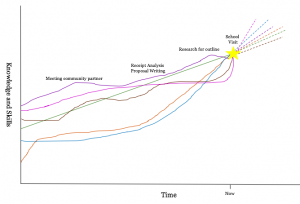
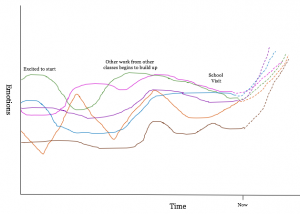
 nd groom the horses. Asides from animals, I have always had a side interest in law. Interestingly enough, I plan on going to law school once my undergrad is completed. I hope to find a career that combines law as well as animal welfare. I would really like to spend the rest of
nd groom the horses. Asides from animals, I have always had a side interest in law. Interestingly enough, I plan on going to law school once my undergrad is completed. I hope to find a career that combines law as well as animal welfare. I would really like to spend the rest of eases caused by deficient or excessive intake. This course inspired me to learn more about how nutrients uptake relates to our body, and also this course let me make my mind to major in nutritional science. During last reading break, I volunteered at Flourance Nightingale Elementary, which aimed at educating kids what is a healthy breakfast should be and why we are supposed to consume less unhealthy food. Through this experience
eases caused by deficient or excessive intake. This course inspired me to learn more about how nutrients uptake relates to our body, and also this course let me make my mind to major in nutritional science. During last reading break, I volunteered at Flourance Nightingale Elementary, which aimed at educating kids what is a healthy breakfast should be and why we are supposed to consume less unhealthy food. Through this experience and lactating mothers, and children under five years of age, providing nutritional advice, assessing malnutrition, promoting breastfeeding, family planning and other healthy behaviours. These experiences prompted me to realize the precarious situations in which low income families find themselves and inspired me to pursue a career in health nutrition in order to focus on improving healthcare quality. I like to think of myself as an adventurer because I get thrilled by exciting experiences whether it’s skydiving or skinny dipping or taking a trip across the world, you name it and I am your girl. I enjoy spending time with people although it doesn’t always seem like it until I get comfortable with an individual. I guess this would be partly because I come from a relatively big family. I am the youngest in a family of 6 and so I did spend a significant amount of time in my childhood around people. Of late I have discovered that I actually do find so much pleasure in seeing things come to life like say seeing a project that I am working on or an event that I am organizing as part of my involvements on campus materialize. In my free time I bike around campus or take a trip to the beach or watch my favorite TV shows. I also tend to spend a significant amount of time on Youtube. I am really excited about this project and am certain that my teammates and I will learn a lot and have fun while at it.
and lactating mothers, and children under five years of age, providing nutritional advice, assessing malnutrition, promoting breastfeeding, family planning and other healthy behaviours. These experiences prompted me to realize the precarious situations in which low income families find themselves and inspired me to pursue a career in health nutrition in order to focus on improving healthcare quality. I like to think of myself as an adventurer because I get thrilled by exciting experiences whether it’s skydiving or skinny dipping or taking a trip across the world, you name it and I am your girl. I enjoy spending time with people although it doesn’t always seem like it until I get comfortable with an individual. I guess this would be partly because I come from a relatively big family. I am the youngest in a family of 6 and so I did spend a significant amount of time in my childhood around people. Of late I have discovered that I actually do find so much pleasure in seeing things come to life like say seeing a project that I am working on or an event that I am organizing as part of my involvements on campus materialize. In my free time I bike around campus or take a trip to the beach or watch my favorite TV shows. I also tend to spend a significant amount of time on Youtube. I am really excited about this project and am certain that my teammates and I will learn a lot and have fun while at it. sues around the world through the knowledge I gain in this major. Every year I visit Iran and witness many families undergo food insecurity, and I am very motivated to reduce food insecurity around the world. I enjoy playing sports such tennis and volleyball and dedicate lots of time to my fitness. I train at the gym at least three times a week to attain a fit and healthy body; working out also reduces my stress and boosts my mood. I love meeting new people because I believe every new acquaintance allows me to gain valuable and unique knowledge. Equality in any aspect around the world such as gender, health, and food is very important to me. I’m eager to try as hard as I can to increase food security in my community through this project because I believe every child deserves food security.
sues around the world through the knowledge I gain in this major. Every year I visit Iran and witness many families undergo food insecurity, and I am very motivated to reduce food insecurity around the world. I enjoy playing sports such tennis and volleyball and dedicate lots of time to my fitness. I train at the gym at least three times a week to attain a fit and healthy body; working out also reduces my stress and boosts my mood. I love meeting new people because I believe every new acquaintance allows me to gain valuable and unique knowledge. Equality in any aspect around the world such as gender, health, and food is very important to me. I’m eager to try as hard as I can to increase food security in my community through this project because I believe every child deserves food security. on sustainable agriculture. Growing up on the west coast of Vancouver Island surrounded by old growth rainforest instilled a love for nature in me at a young age, which has now evolved into a passion for conservation. What I love about my university program is that it allows a blending of sciences and humanities, an interdisciplinary approach often breeds diverse solutions to complex
on sustainable agriculture. Growing up on the west coast of Vancouver Island surrounded by old growth rainforest instilled a love for nature in me at a young age, which has now evolved into a passion for conservation. What I love about my university program is that it allows a blending of sciences and humanities, an interdisciplinary approach often breeds diverse solutions to complex Kate Stafford:
Kate Stafford: